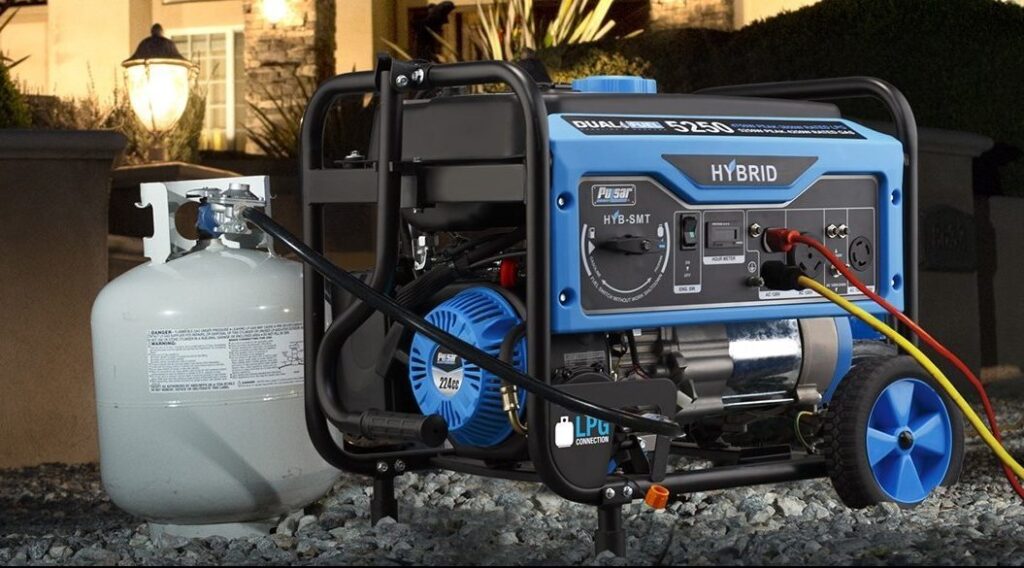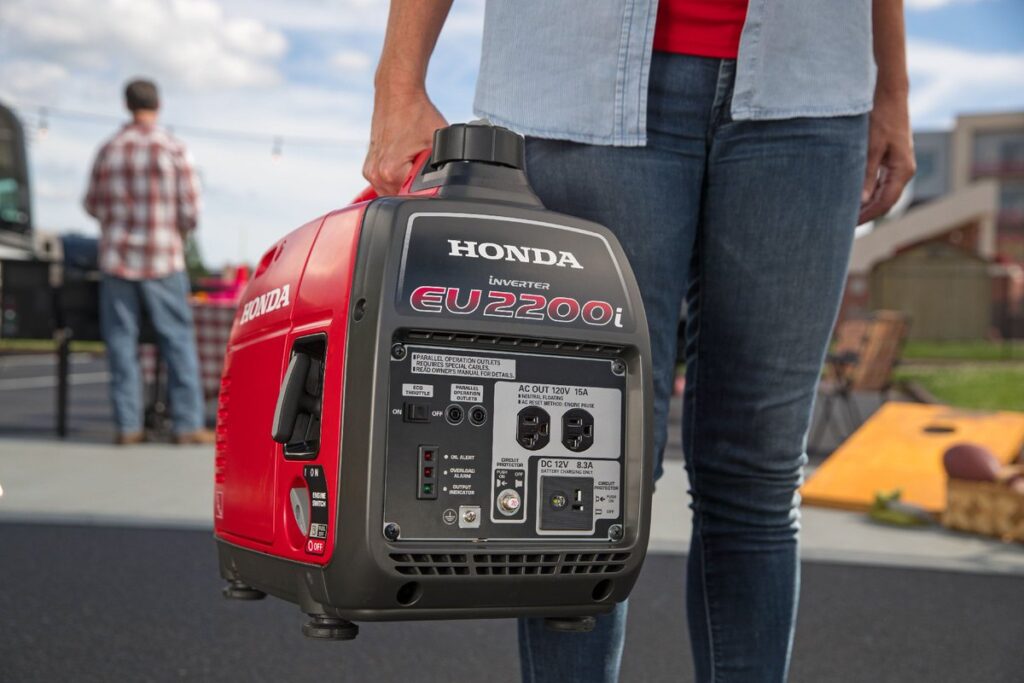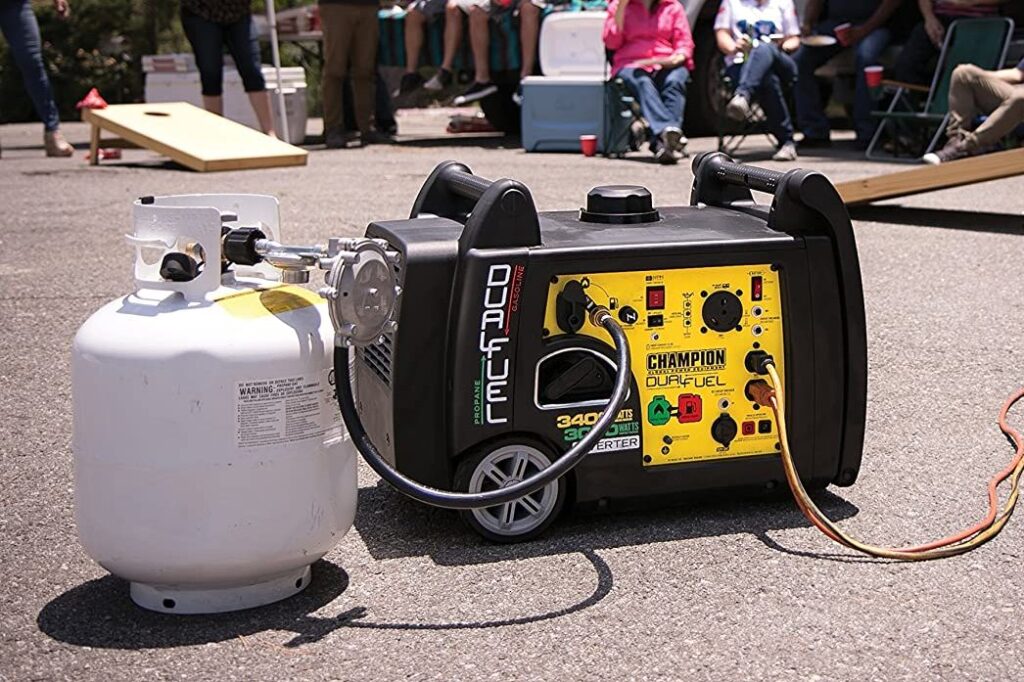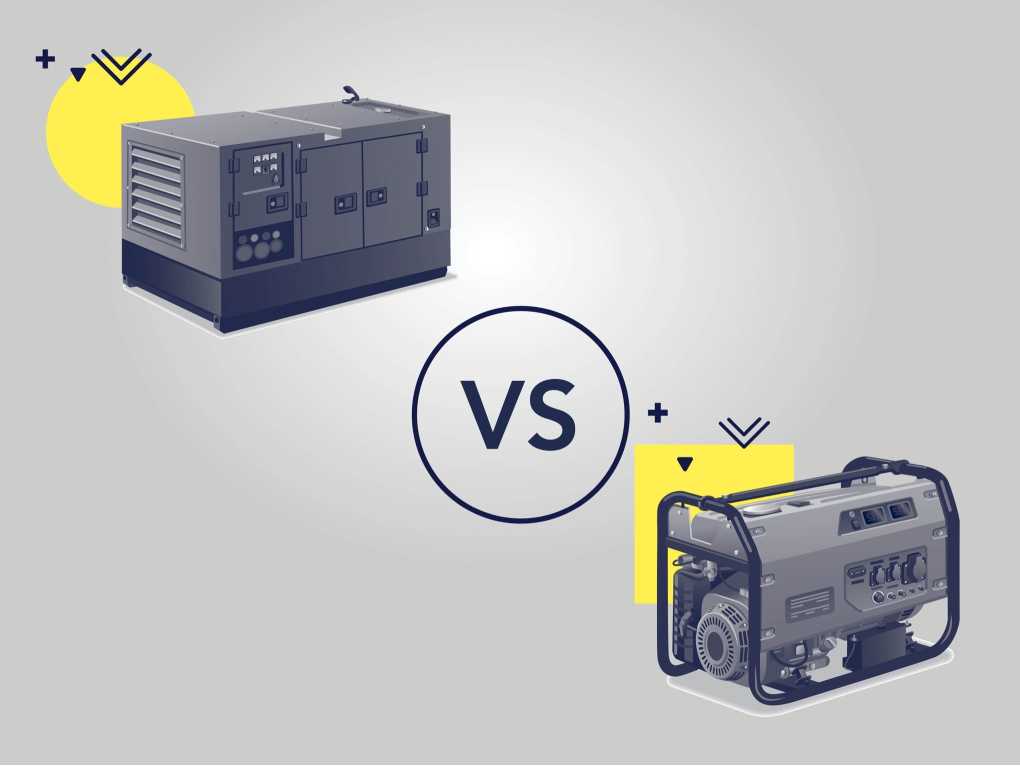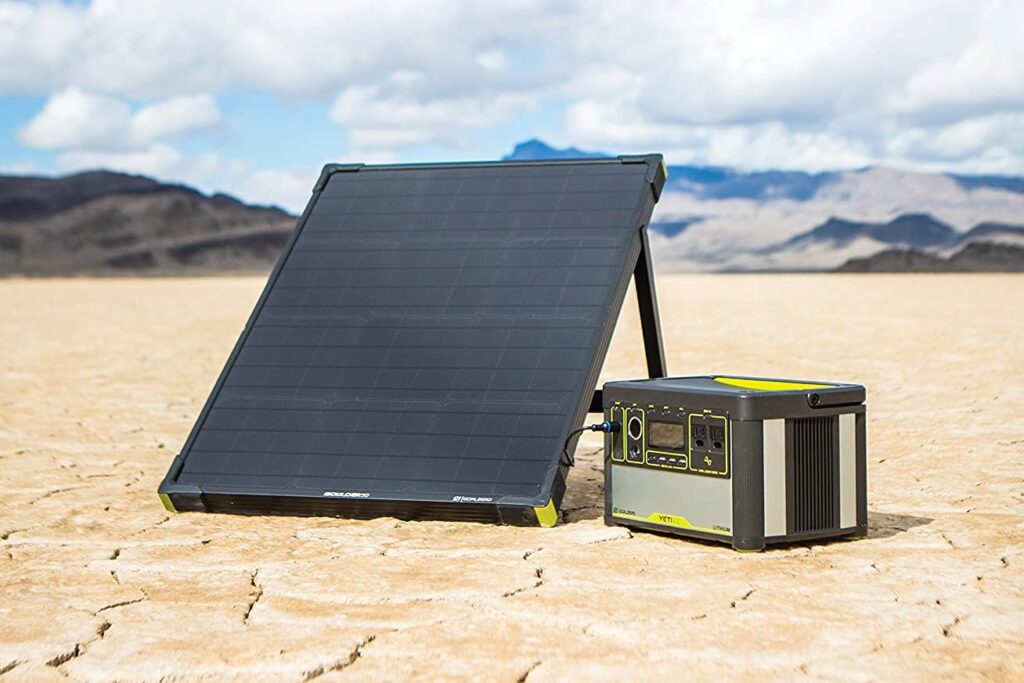Since last year, US power outage has spiked by 64%. And this statistic is related to increase of generators being purchased by every fifth household and RV owner. Instead of spending time hoping that another blackout won’t happen, start looking for the right device to power up your house or vehicle.
To help you find 12 best generators for all causes we’ve tested safety and efficiency of over than 20 models. We’ve got the most impressive results with WEN 56200i. We’ve checked the truth about the most important factors of these devices. We found quiet models that won’t exceed 60 dB noise level while powering small houses. We’ve also opted for lightweight and compact generators if you own an RV. We’ve also considered powerful generators that can work for more than 10 hours straight. Read on to find the right model for you!
This generator is our Editor’s Choice. It may be the best option if you are on a budget. Its lightweight design makes it easy to transport.
The 1 gallon tank provides mode than 6 hours operating time at half load. This is an impressive runtime for an affordable and small generator like this. And also, you can always increase the fuel economy by putting it in eco mode.
It has a peak and rated watts of 2,000 and 1,600. It uses a 79.7 cc 4-stroke OHV engine. The noise level ranges from 50 to 55 dB (A). The manufacturer warranty extends up to 2 years.
And if you want more power, you can link another generator from the same brand using a parallel kit to share the power among these two units.
The complete panel comes with three 120V power outlets, one 12V DC power outlet, and one 5V USB port. You will also find that it has a low oil and fuel consumption shutdown feature. There are indicator lights and overload protection to keep your generator and electronics safe.
The only downside with this generator is the weight and the size. It is a bit heavy and larger in dimension when you compare it to other portable generators, which can make the transport a little difficult.
Warranty: 3-year limited
This versatile dual fuel inverter generator from Champion is an all-around performer. The generator is capable of putting out 3,100 watts of continuous power on gasoline or nearly 2,800 watts on propane, making it ideally suited for powering essentially household appliances during an outage or for running a small-to-medium-sized RV. To make running an RV easier, the generator even comes with a 30-amp RV-ready outlet so you can plug your vehicle’s grid directly into the power source. Be aware for other uses, though, that having just two 120-volt power outlets can be somewhat limiting.
Despite the somewhat larger power capacity of this generator, it doesn’t compromise on portability. The generator is surprisingly small and lightweight, and is mounted on a set of hidden wheels so you can easily take it anywhere. For RV camping, the generator is quiet enough – 59 dB at 25% power output – that you won’t attract attention from your neighbors.
The main downside to this generator is that the runtime is somewhat short, especially when running on gasoline. The small 1.6-gallon fuel tank only holds enough gas to provide 7.5 hours of power at a 25% load – so if you try running the generator near its capacity you’ll run through the tank in just a few hours. However, if you run on propane you can connect multiple tanks so that you can run the generator for essentially as long as you like.
That said, the generator is reasonably priced and even comes with an electric starter to make life easier. There’s also a backup recoil starter in case the battery ever runs dead, so you won’t find yourself without power. To sweeten the deal, Champion includes a three-year warranty on this generator.
This medium-sized inverter generator from Firman is the perfect pairing for your next RV trip. The 3,300 watts of surge power and 3,000 watts of continuous power offer enough juice to power all of your basic RV appliances, including a refrigerator-freezer, microwave, and even a small air conditioning unit. On top of that, the generator comes with an RV-ready 120-volt 30-amp outlet so you can connect it directly into your RV’s power grid.
Users noted that the runtime on this generator is relatively short – just 9 hours at half-load – so you’ll need to keep a jerry can of fuel onboard your RV if you’re out for an extended trip. However, since most RV users only had the generator on in the mornings and evenings around camp, they didn’t find that their power was interrupted by having to add fuel to the tank.
What makes this generator even better for camping trips – as well as any other use – is that its relatively lightweight, compact, and quiet. The generator weighs just 90 pounds and is mounted on a small set of wheels so you can easily tow it around camp or home. While the design is boxy, this is precisely so that it can fit neatly into the generator compartment on the outside of most RVs. And when running at 25% load, this generator produces just 58 dB of noise so that it’s quiet enough to hold a conversation around and to not bother your neighbors at a campground.
In addition to the RV-ready outlet, this generator offers one USB charging ports for small electronics and option of the remote start. The only thing is that few people reported having trouble with the recoil starter. Firman offers a three-year warranty on this generator for peace of mind.
This 4,500-watt generator from Pulsar is not only budget-friendly – it’s also one of the best choices if having a remote starter function is important to you. The remote start can be a major advantage during a power outage at home or for using the generator with an RV, since you don’t need to venture outside to turn the generator on. With those uses in mind, it’s important to note that the generator sports an RV-ready 120-volt 30-amp outlet and offers enough power to keep most RV and essential home appliances running. However, be aware that users found that this generator makes a loud whining noise when running close to its rated 3,700-watt power output.
The generator is also surprisingly portable for a 4,500-watt generator since it’s mounted on a set of small wheels and has a single carry bar across the top. Users also appreciated the telescoping handle, which makes it easy to carry this generator in tow around the house or campsite.
The downside to using this generator either at home or with an RV is that it’s somewhat noisy – it produces 64 dB of noise at a 25% load and gets even louder with its whine as you turn up the power. In addition, the fuel efficiency and runtime of this generator are not particularly impressive for the 4,500-watt inverter generator class. Pulsar’s model offers just 7 hours at a 50% load.
One other thing to keep in mind is that this generator only offers two 120-volt outlets in addition to the RV-ready outlet. Given the power output, many users would have liked to have additional outlets. However, the included USB port was a convenient addition for charging small electronics.
This standby generator from Generac is specifically designed to keep your home running without a hitch in the event of an extended power outage. The generator is outputs 22 kilowatts of power when running, which ensures that even medium to large houses won’t exceed the capabilities of this generator. While you can fuel the generator with propane for short-term outages, the generator can also be connected to your home’s natural gas supply line during installation to ensure that you have a nearly limitless fuel supply and runtime.
Importantly, this standby generator is one of the quietest on the market today. When running at a 25% load, it produces just 57 dB of noise – virtually ensuring that your neighbors won’t even notice you have a generator running. The monthly power cycles in the generator are even quieter.
The main catch to this generator is that it’s quite an investment. On top of the cost of the generator itself, you’ll need to pay to have it installed and connected to your home’s natural gas lines. Plus, since the generator only produces 240-volt power, you’ll need a step-down transformer to connect it to your home’s power grid – and installing that will require most people to hire an electrician.
That said, the generator’s price does include a 200-amp smart transfer switch, which allows you to seamlessly and safely switch between grid and generator power when an outage occurs. In fact, the smart switch will automatically turn the generator on when the power goes out and you can even get an alert on your phone that your generator has turned on. On top of that, Generac provides a five-year warranty on this generator.
For the most demanding on-the-go power needs, there are few solutions better than this generator from DuroMax. The generator is rated to output an incredible 12,000 watts of surge power and 9,500 watts of continuous power. That’s more than enough to power most appliances in your home during an outage, as well as to power a massive work site or large RV. Even better for homeowners and contractors, the generator offers the ability to draw 240-volt power through one 30-amp and one 50-amp outlet for powering the most heavy-duty tools and appliances.
Another major advantage to this generator is that it’s a dual fuel generator, so you can use either gasoline or propane with it. The ability to use propane can be a major cost-savings measure over the long-term, since this generator unsurprisingly guzzles fuel. When running on gasoline, the generator runs through nearly eight gallons of gas in just 10 hours at half-load.
This generator is about as loud as you’d expect – 74 dB at 25% load – but compared to other behemoth generators it’s actually relatively quiet. You’ll still likely want ear protection if you’ll be working in the vicinity of the generator, though. In addition, despite the size of this generator, it is portable by teams of two to three. The generator is heavy to lift, but is mounted on large pneumatic tires so that you can easily tow it from your truck to your worksite or around the house.
Keep in mind that while users found this generator to be relatively reliable over the course of a few years, durability is an issue with any generator this large. DuroMax offers a strong three-year warranty for residential users, but drops that warranty to just one year for commercial users – a major disincentive for contractors to opt for this model.
Whether you need a source of power as you travel across the country, or you need a backup source of power, you will find the Goal Zero Yeti 1500X to be an excellent companion.
This is the second-generation lithium power station introduced by Goal Zero and it comes with some pretty exciting features.
The manufacturer has been in the business of making power generators for more than ten years, and this is one of the best products that they have come up with. So, what features makes this an excellent option? Let’s see.
For one, it has a good capacity. It could run your appliances for close to a day without any drop in power. While there are other models from the manufacturer with more capacity, for the price, this is a really good option.
Another thing that we liked about this model are the options for discharge. This unit has the regular USB, 12v DC, AC, and USB-C PD ports. All of these ensure that you can always find a way to connect your appliances to the generator.
This relatively inexpensive inverter generator from Generac is a versatile choice for anyone whose power needs and budget are modest. The generator is capable of producing 2,200 watts of surge power and 1,700 watts of continuous power – enough for powering basic tools around the yard or for adding power to your next camping trip.
The generator is lightweight and portable, weighing just 47 pounds. While users found that the single carry handle is comfortable for short distances, the lack of wheels can become annoying if you need to frequently move the generator when filled with gas. While the noise output of this generator is not specified by Generac, users found that it is on par with other 2,000-watt inverter generators and that you can easily hold a conversation over the generator up to half-load.
The disadvantage of this generator compared to a more expensive alternative is that the engine is relatively inefficient and the gas tank is small. The generator runs for just 10.75 hours at a 25% load, essentially requiring you to turn the generator off, wait, and refuel it every few hours for most uses. Depending on your application, this can be a major limitation.
In addition, the warranty on this generator is relatively short, at just two years for residential users and one-year for commercial users.
That said, the outlet panel on this generator is nicely equipped with a pair of 120-volt outlets, a 12-volt DC charging port, and a USB charging port. The two 120-volt outlets have simple reset buttons so it’s easy to reset the generator without turning it off in the event of a short.
This incredibly quiet inverter generator from Honda is perfect for when you need power without the typical loud engine noises. The generator produces up to 3,000 watts of surge power and 2,800 watts of continuous power, enough to cover most essentially appliances like a refrigerator, freezer, television, and air conditioner all at the same time. Better yet, it does this while producing a maximum of just 57 dB of noise. For comparison, the similarly powerful Wen generator produces 57 dB of noise at a 25% power load.
On top of that, Honda built this generator to run for long periods. The hefty 3.4-gallon fuel tank is significantly larger than the average for this class of generators and allows the engine to run for up to 20 hours at a 25% load. That’s a huge difference if you need all-day power, since most other generators will require you to stop and refuel in the middle of your work.
One thing that users didn’t love about the design of this generator is that it is bulky and heavy, but doesn’t come mounted on wheels. While there are two lift bars on either side of the generator, these are better suited to a two-person lift than to a single person trying to move the generator.
In addition, while users appreciated the included electric start, the generator is somewhat lacking in additional outlets. There are no USB ports, only two 120-volt outlets, and one 30-amp locking outlet.
Still, users felt that the high price of this generator is somewhat justified by the extremely fuel-efficient and reliable Honda engine, which comes with a three-year warranty.
This 3,600-watt generator from Westinghouse keeps its price tag reasonable by blending the features of top-rated conventional gasoline generators. Unlike most modern inverter generators, the engine is not fully covered – which does contribute to this generator making slightly more noise than necessary and leaves open the possibility of burning yourself on hot engine parts. In addition, the 212cc engine is a four-stroke, a more efficient one like those used on most inverter generators.Also, the generator is completely safe to use with sensitive electronics.
This design has some interesting advantages and drawbacks. On the one hand, the generator is able to produce up to 3,600 watts of continuous power – which is at the output limit of today’s consumer-friendly generators. It also has an extremely long 13.5-hour runtime at 50% load, which users who need a generator for all-day power production appreciated.
On the other hand, the Westinghouse generator is somewhat noisy compared to competitors, producing 68 dB of noise . When running at full power, it will sound comparable to any conventional generator.
Users liked that the generator comes with a fully-featured outlet panel, including 120-Volt duplex household outlet, L5-30R and TT-30R that can be adapted for use with an RV. There’s also a small LCD display that shows the wattage being drawn from the generator and the remaining runtime.
Apart from that, users receive a lengthy three-year warranty with this generator, along with lifetime technical support.
Generac has been able to make this powerful diesel generator that is going to get through plenty of work. It has a high level of performance with numerous impressive specifications, such as being rated for 5000 watts. Despite that high level of power, the generator is quite efficient, and it will make the most of its fuel.
A great feature of this generator is the high fuel capacity of 12 gallons. That allows you to have a very long runtime before you even need to think about refilling. You can power up a wide number of devices for a full day of use. That runtime is around 32.4 hours, which is much longer than many of its rivals.
You get a good range of outlet options here with four different types available. While that should be more than enough for your needs, it’s always a good idea to double-check that you’ll have the right outlets for your devices.
The noise level is up to 110 dB, which is very loud, but that’s to be expected from a powerful generator. Added to that, the generator is very heavy and you’ll probably need a wheel kit in order to move it. It’s listed at 254lbs, and therefore, you’ll need at least two people to move it into place.
Another impressive advantage of this diesel generator is the durability. This is shown by the steel frame which can take a lot of punishment over its lifetime. The recoil with electric start is simple to use, and the whole generator is very easy to operate. It’s the perfect generator are anyone looking for high power and a long runtime.
This small generator from DuroStar is designed to compete with the myriad of portable gasoline generators on the market. But where gasoline generators wear down over time, users note that this model can run for decades with minimal maintenance.
The generator is relatively powerful, producing 3,300 watts of continuous power or 4,000 watts of surge power. That makes it a great choice for everything from worksites to RV trips to home use. However, keep in mind that the eight-hour runtime at half-load can be somewhat limiting since you won’t get a full day’s worth of power under most circumstances.
The outlet panel on this generator offers few frills, but it does offer everything users wanted including an analog display of the wattage being drawn from the generator. The 120-volt 30-amp outlet is not RV-ready, but it can be easily used to connect to an RV’s power grid with the addition of an adapter.
The downside to this generator is that it’s very loud, especially when compared to similarly powerful inverter generators like those from Honda or Wen. The DuroStar generator produces 69 dB of noise at a 25% load, which is already loud enough to prohibit conversations and draw complaints from neighbors at a campsite. When the generator is running at full power, users warn that it’s worth having ear protection available.
When it comes to price, this probably isn’t the cheapest generator on the market – but it is one of the most cost-efficient. That’s because you can balance the lifetime cost of this generator – which will last for years and comes with a three-year residential warranty.
Now that you’ve learned more about our 12 overall favorite generators on the market today, how do you choose between them to find the generator that’s right for your needs? In our buying guide, we’ll cover the differences you need to know about between different types of generators, fueling options, and features, as well as answer some frequently asked questions about generators.
There are different types of generators for different needs. If you need power just at home, for example, you might be better suited by a stationary standby generator than a portable generator. Similarly, the types of appliances and electronics you plan to power can determine whether an inverter or conventional generator is better suited to your needs.
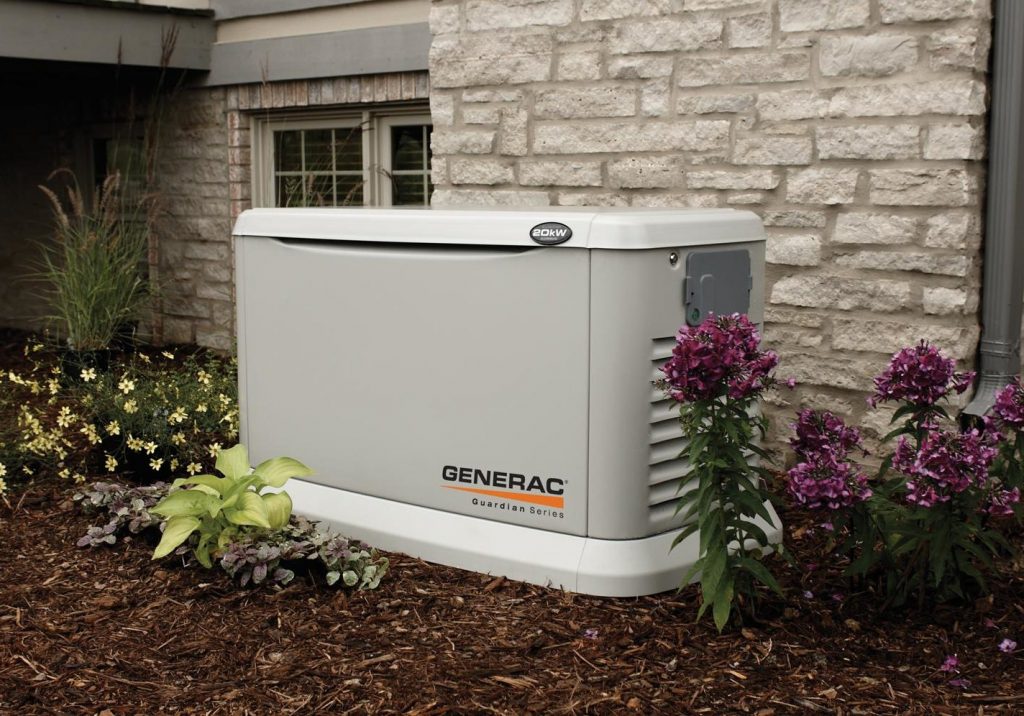
The first choice you need to make is whether a portable or standby generator is best for you. A standby generator is typically designed to power most or all of a house’s electricity needs during a short-term or extended power outage. Because of this, standby generators are typically found in storm-prone areas where long outages are common. These generators are stationary, installed outside the home, and may be connected to a natural gas line to allow for unlimited fuel sourcing in the aftermath of a storm. Compared to portable generators, standby generators typically put out far more wattage – greater than 10 kilowatts – and produce very little noise.
Portable generators are more versatile and can be used for anything from camping and RVing to outdoor parties and powering your home during an outage. Portable generators come in a huge variety of shapes, sizes, and power ratings to cover the widest range of needs, but it’s important to keep in mind that some portable generators are easier to transport than others.
Conventional generators produce AC electricity directly from their engines, which can then be used to power appliances and tools. However, this AC electricity is relatively “dirty” – it can damage sensitive electronics like smartphones, computers, and anything with a microchip.
Inverter generators take that AC electricity and then convert it to DC power and back to AC electricity. This essentially cleans the electricity, reducing the overall distortion of the electrical waves so that it is safe to use with sensitive electronics. In addition, inverter generators use microcontrollers around the engine that allow them to be much more fuel efficient compared to conventional generators.
If you have multiple inverter generators, you can connect them in parallel to increase your power output.
However, there are some drawbacks to inverter generators. They tend to cost more than conventional generators, although that price gap is closing as the technology further improves. In addition, inverter generators are currently limited to a maximum power output of about 4,000 watts – if you need more power than this, you’ll need to choose a conventional generator.
Once you’ve decided what type of generator you need, the next thing to determine is how much wattage you need. Generators range from small portable generators offering less than 2,000 watts of power to massive portable generators like the model from DuroMax that offer up to 12,000 watts. Standby generators like the model from Generac offer yet more power – over 20 kilowatts.
The best way to determine how much power you need is to add up the wattages of all the appliances and tools you expect to run at a single time. This number needs to be less than the continuous wattage of your generator. If you have motor-driven appliances like a refrigerator, freezer, or air conditioner, you’ll also need to consider the start-up power requirements of these appliances. When starting, the wattage cannot exceed the surge wattage of your generator.
Keep in mind that it’s easier to opt for a larger than necessary generator initially than to increase your available power later. In addition, the closer you run your generator to its rated power output, the faster you’ll run through fuel and the more noise the generator will produce.
It’s always a good idea to choose a generator that is slightly larger than you calculate that you need.
When it comes to portable generators, gasoline is the most common fueling option. However, dual fuel generators like the models from Champion and DuroMax can run on either gasoline or propane. Propane is often less expensive than gasoline, but you’ll get slightly less power out of your generator when running on propane because it’s a less energy-dense fuel. That said, propane offers the advantage that you can run your generator more or less continuously by switching propane tanks out on a single fuel line.
Although more expensive and less common, some portable generators like the model from Generac XD5000E can run on diesel fuel. These generators tend to be virtually indestructible and are more immune to the frequent price shifts around standard gasoline.
Finally, some tri fuel portable generators and many standby generators can run on natural gas. Natural gas is less energy-dense even than propane, so you’ll see some power loss when running your generator on natural gas. However, natural gas is by far the cheapest fuel option and is virtually unlimited if you tap into your home’s natural gas line. This is a major advantage for standby generators, since natural gas lines often continue to provide fuel even during extended power outages and in the aftermath of major storms.
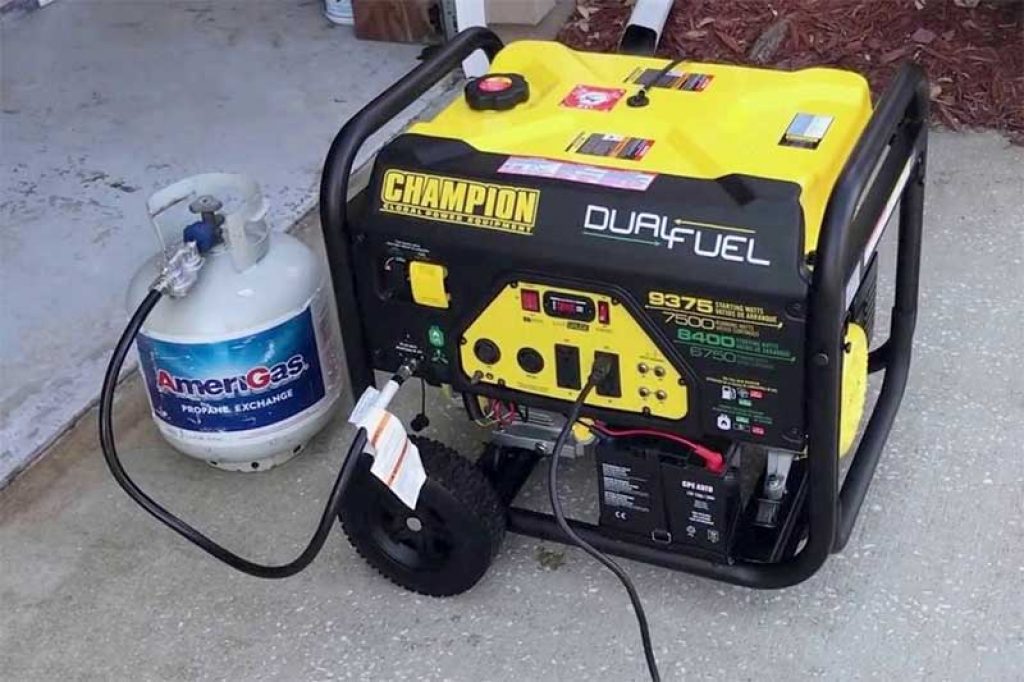
If you are always planning to run your generator on gasoline, runtime can be extremely important. For example, a generator with a long runtime like the model from Champion 3400-Watt Dual Fuel Inverter can allow you to generate power for an entire day of work, or an entire evening in your RV or campsite. On the other hand, a generator with a small fuel tank and limited runtime can require that you turn off the power every few hours, cool down your generator, and then refuel.
Keep in mind that for dual fuel generators running on propane, it’s possible to extend the runtime simply by using a larger propane tank or by connecting multiple propane tanks to a stopcock valve. If you are running a tri-fuel generator or a standby generator on a natural gas line, the runtime may be extended up to several days.
Modern generators are equipped with several important safety features that protect both you and your generator. The first of these is a low-oil shutoff – every portable generator that we reviewed will automatically shut itself down before it runs out of oil. This protects the engine from irreversible damage as well as power surges that could occur if the engine were to fully run out of oil. Nearly all generators also have a low oil warning light so that you know ahead of time to turn the generator off.
The other important safety feature that generators have is overload prevention. Generators will automatically shut themselves down if you exceed their surge power at all, or if you exceed their continuous rated power for more than a few seconds. This prevents the engine from overheating, which can essentially melt important components of your generator and poses a dangerous fire hazard.
Another important thing to consider when choosing a generator is whether it has features to make it easier to use. Many inverter generators offer electric starters in addition to the standard recoil starter, and some, like the model from Pulsar, offer remote starters so you don’t even need to leave the house to start your generator. Other generators, like the DuroMax model, offer voltage meters so you can keep an eye on how much power you’re drawing and whether you are close to overloading the generator.
Another important ease of use feature to consider is whether your generator has a drain on the carburetor. This feature makes it significantly easier to drain fuel out of the generator ahead of a long storage period, which is important so that you don’t end up with stale fuel in your engine.
If you don’t have a drain, you’ll need to run your generator dry – which isn’t good for the engine over the lifespan of the generator.
The amount of noise that a generator makes can be a big factor in where and when you can use it. For example, a noisy generator might not be a problem at a construction site, but if you’re camping or trying to run your generator outside your house at night you’re likely to draw complaints from your neighbors.
In general, inverter generators are quieter than their conventional counterparts and smaller generators make less noise than larger generators. Keep in mind also that generators typically produce more noise as you push them closer to their rated wattages.
When choosing a generator based on noise, it’s important to think about whether your application requires an ultra-quiet generator. Generators like those from WEN and Honda are priced at a significant premium specifically because they are among the quietest generators on the market in their respective power classes – so you’ll need to consider whether that added price is worth it for you.
Not all portable generators are equally portable, so it’s important to think about the size and weight of your generator and whether it is mounted on wheels. Lightweight generators like the portable model from Generac may not have wheels, but this isn’t a problem since a single person can easily carry it. On the other hand, a massive generator like the model from DuroMax may require two or three people to lift it in and out of a vehicle – even though it is mounted on wheels to make transporting it the rest of the way easier. Consider where you’re likely to use your generator, how you plan to get it there, and whether you can lift the weight of your generator by yourself.
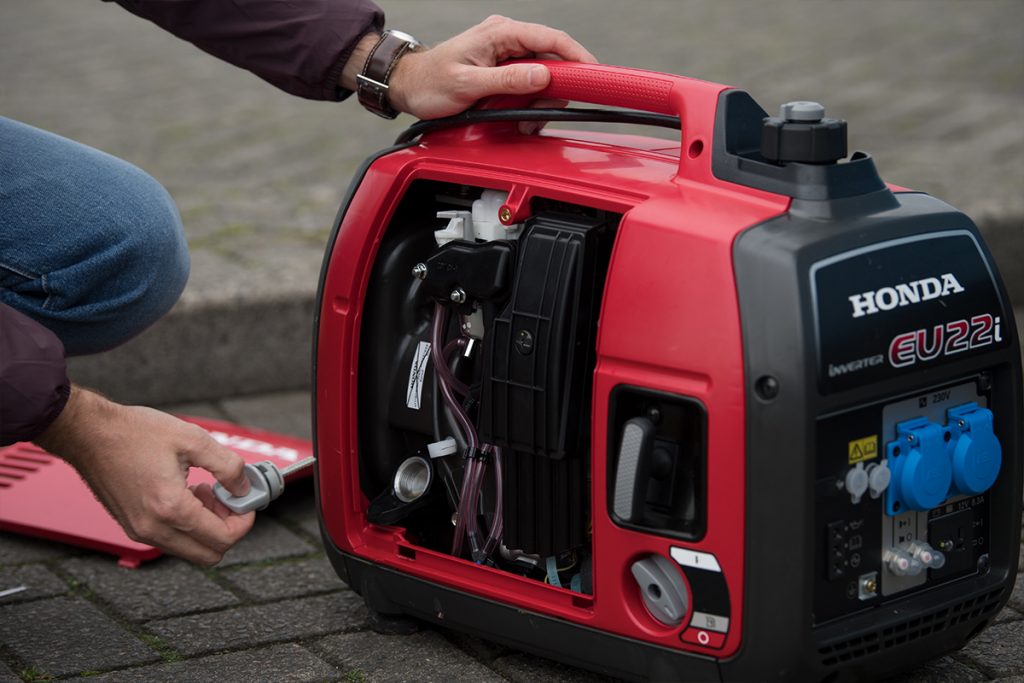
All of the generators we reviewed are built to last, but having a warranty from the manufacturer can provide significant peace of mind. Manufacturers’ warranties range from just one year to up to three years, as for the Pulsar generator. Warranties for standby generators are often five years or longer. Keep in mind that many manufacturers limit the warranty for commercial users since the generator is assumed to see more frequent use.
Customer service is also an important component of having peace of mind after your generator purchase. Companies like Generac and Champion are beloved by customers for their support – Champion offers lifetime technical support for many of its generators – which makes it much simpler to file a warranty claim in the event that anything goes wrong with your equipment.
Generators cover a huge range of prices depending on whether you are looking at a portable or standby generator, an inverter or conventional generator, or a small or large generator. On the inexpensive end of the spectrum, a generator like the DuroStar model costs under $300. WEN and Honda generators typically cost the most because of their premium engines – the Honda generator costs over $2000. Standby generators also tend to be large investments, costing in the several thousands of dollars depending on the exact model.
Maintenance is the most important thing you can do to ensure you get a long life of work out of your generator. There are two critical things you should always do to make sure your generator runs smoothly.
The first is to change the oil relatively frequently. You should change the oil in your generator after the first 20 hours of use, and then every 50–100 hours of use after that. Keep an eye out for the low oil light – if you see this come on, you should power down the generator immediately to prevent engine damage. It’s always a good idea to keep fuel and filters on hand with your generator when you’re using it or travelling with it.
The second thing you need to do to protect your generator’s engine is to prevent fuel from going stale inside your generator. Before you put the generator away for a long storage period, be sure to fully empty the gas tank and drain the carburetor of any remaining fuel. If your generator does not have a carburetor drain, you’ll need to run it dry to remove the leftover fuel. Be sure to always fill your generator with fresh fuel after the storage period, as well.
Beyond that, there are some important safety tips to keep in mind when using your generator. Always allow it to cool down before adding more fuel to the tank – adding fuel to a hot generator is a dangerous fire hazard. In addition, never backfeed your generator. If you plan to connect your generator to your home, you need to invest in a transfer switch and take the time to safely hook up your generator to your house’s electrical grid.
Our three overall favorite generators on the market today are the WEN 56200i, the Champion Power Equipment 100263, and the Firman W03083. All three of these generators are designed for portability, and the Champion and Firman generators come with RV-ready outlets so you can easily take them on the road. Users appreciated the power, diversity of outlets, and the compact and lightweight design of the Firman W03083 generator, which made it ideally suited for a variety of RV trips. The Champion generator offers slightly less power, but is more versatile for providing power for any need thanks to its quieter operation and the option to fuel it with either gasoline or propane. We feel that the WEN generator is the overall best generator for most users since it provides a reasonable amount of power in an extremely compact and lightweight package.
